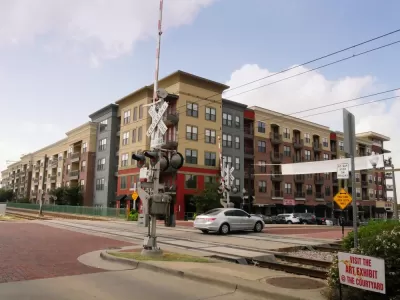A lawsuit has been successful in derailing the Plano Tomorrow plan, approved in 2015. The city could default to its 1986 plan.

[Updated August 4, 2020 to more accurately describe the actions of the Plano City Council in July 2019. The City Council did eventually default to the 1986 master plan in August 2020.]
"Plano City Hall, at war for more than three years with a group of residents fed up with their community’s rapid growth, has set a vote for later this month that could repeal its much-criticized master development plan and end the lawsuit it inspired," reports Sharon Grigsby.
The plan in question, Plano Tomorrow, was approved in 2015, "after what it described as a several-years-long listening tour involving thousands of residents in a variety of venues, including online surveys and formal hearings."
"Leaders revised the plan at least twice to appease residents who were worried that it would lead to more apartments and big developments that would erode Plano's suburban atmosphere," according to Grigsby, but "[b]ased on my conversations with many Plano residents in recent months, the Plano Tomorrow lawsuit symbolizes what they see as local leaders who don’t listen to their concerns. City Hall had long maintained that it had the facts on its side in the lengthy legal battle, but it has long been losing the public relations war."
The group Plano Future organized the lawsuit and opposition to the plan, and the movement has had far reaching consequences—reaching all the way to the governor's office, as explained in the article.
FULL STORY: Plano sets a vote that could repeal the master development plan that split the city

Maui's Vacation Rental Debate Turns Ugly
Verbal attacks, misinformation campaigns and fistfights plague a high-stakes debate to convert thousands of vacation rentals into long-term housing.

Planetizen Federal Action Tracker
A weekly monitor of how Trump’s orders and actions are impacting planners and planning in America.

In Urban Planning, AI Prompting Could be the New Design Thinking
Creativity has long been key to great urban design. What if we see AI as our new creative partner?

How Trump's HUD Budget Proposal Would Harm Homelessness Response
Experts say the change to the HUD budget would make it more difficult to identify people who are homeless and connect them with services, and to prevent homelessness.

The Vast Potential of the Right-of-Way
One writer argues that the space between two building faces is the most important element of the built environment.

Florida Seniors Face Rising Homelessness Risk
High housing costs are pushing more seniors, many of them on a fixed income, into homelessness.
Urban Design for Planners 1: Software Tools
This six-course series explores essential urban design concepts using open source software and equips planners with the tools they need to participate fully in the urban design process.
Planning for Universal Design
Learn the tools for implementing Universal Design in planning regulations.
Gallatin County Department of Planning & Community Development
Heyer Gruel & Associates PA
JM Goldson LLC
City of Camden Redevelopment Agency
City of Astoria
Transportation Research & Education Center (TREC) at Portland State University
Jefferson Parish Government
Camden Redevelopment Agency
City of Claremont




























